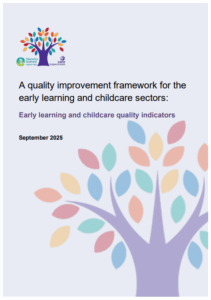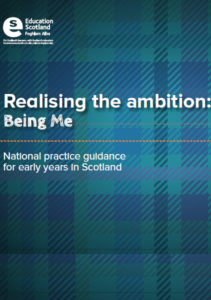Leadership of continuous improvement p16 – Leadership and professional learning
We engage in a broad range of professional learning that enables us to remain
knowledgeable, skilled and up to date in our practice. We use professional learning and development opportunities very well to influence and support pedagogy, practice and improvement priorities to improve outcomes for all children, with a strong focus on equity and inclusion.
Children experience high quality spaces p22 – Children influence and affect change
We have a supportive environment where children are valued and celebrated. High-quality resources and spaces promote diversity, equity and inclusion. Children, their families and wider communities are positively reflected in the resources, spaces and experiences available. Children feel seen and included. Our enriching setting fully supports children to develop their knowledge, respect and understanding of their community and wider world.
Children experience high quality spaces p25 – Challenge questions
How do we promote diversity, equity and inclusion and how are these positively
reflected in the resources, spaces, and experiences available?
Wellbeing, inclusion and equality p51 – Positive relationships and wellbeing
We support children to understand and manage their emotions and behaviour in ways that promote positive relationships, engagement and inclusion. We understand fully that relationships lie at the heart of children’s development and lay the foundation for lifelong learning and wellbeing. The wellbeing of children and families is paramount and is central to the work of our setting.
Wellbeing, inclusion and equality p55 – Identifying and assessing learning needs and targeted support
Our senior leaders and staff adhere fully to legislative requirements. We provide high quality targeted support to all children who require additional support, including access to digital technology, to reduce barriers to inclusion and learning.
Wellbeing, Inclusion and Equality p57 – Challenge questions
To what extent do we have regular, high-quality professional learning to support
wellbeing, inclusion and equality? What impact does this professional learning have?


